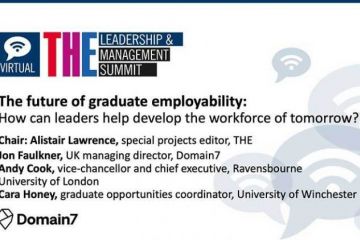Chemistry students learn theory diligently, but conveying what a chemist does is a different skill. Nigel Lowe and John Garratt conducted an experiment to broaden minds
There are more research chemists than ever. Just witness the bookshop and library shelves groaning under the weight of their findings.
Undergraduates, too, are weighed down by facts and arsenals of underlying mathematical theory.
Contrast this with bright-eyed interviewees enthusing about a discipline that provides new materials and medicines to shape our world.
University courses strive to retain this enthusiasm while cramming in content. The result often seems to be well-informed chemists rather than well-rounded ones.
To broaden students' horizons we decided to experiment. Fifteen undergraduates at Warwick and York universities agreed to take part in a project involving questioning professional research chemists about their work and opinions. The students had to write a 1,500-word article, accessible to a general audience. The Engineering and Physical Sciences Research Council provided funding, from which students received £150 in three stages. We gave written guidelines, including questions, and offered to arrange a publisher for the best articles.
Interviewees included research chemists from commerce and government, a member of academic staff and two PhD students from Warwick and York. We tried different interview formats: one-to-one, two students and one interviewee, and a press conference - given by York alumnus and television presenter Adam Hart-Davis.
All 15 students passed the first stage and produced draft reports. The students had clearly drilled interviewees about their research, sources of funding, the public's perception of science, science education, science and the media and so on.
One of the PhD students was quite shocked about having to justify the way public money was being spent on such apparently esoteric research.
The quality of the articles varied. Two were good enough to be published in Chemistry Review , a magazine for sixth-formers. Others never broke free of the dry style of laboratory reports, unable to recognise that much technical jargon was meaningless to the public.
The volunteers said they enjoyed the experience, particularly discussing issues not raised elsewhere on their course. Several said it was useful to see what chemistry graduates do further down the line. Most thought the interview project could be usefully included in their courses.
The project left us thinking about the difficulties of curriculum innovation. The exercise had taken 15 to 20 hours of student time and a substantial commitment from staff.
There was also the question of finding and maintaining a suitable pool of interviewees.
The model, however, has proved transferable. An interview project is now the centrepiece of a mixed science and arts course option at York. The students' brief is to interview a leading research scientist and write a newspaper-style article.
We are also introducing an interview-based exercise into our industrial placement scheme to encourage students to appreciate what chemistry graduates contribute to companies from their busy laboratory benches.
Nigel Lowe is a teaching fellow and John Garratt is emeritus fellow at the department of chemistry, University of York. Sample articles: www.york.ac.uk/res/sots/Interview1.htm and www.york.ac.uk/res /sots/Interview2.htm
STUDENT FEEDBACK
Things I learnt
* How to conduct an interview
* Expressing scientific ideas in a universally understandable way
* Insight into role of a chemist on a large chemical site
* A chance to apply chemistry but not in an exam
* The idea of chemistry as a writing career
* Experience of working to editorial constraints.
Main difficulties
* Doing revisions
* Hard to get into the writing style
* Judging the level of scientific content
* The interviewee was cagey about giving me examples of commercially sensitive chemistry
* Finding the time outside my chemistry course.
Best bits
* Speaking to someone "at the next stage" of a career in chemistry
* Meeting the interviewee
* The money!
Worst bits
* The revisions
* The write-up - difficult to start as no examples were provided
* The fact that it took me so long.
Register to continue
Why register?
- Registration is free and only takes a moment
- Once registered, you can read 3 articles a month
- Sign up for our newsletter
Subscribe
Or subscribe for unlimited access to:
- Unlimited access to news, views, insights & reviews
- Digital editions
- Digital access to THE’s university and college rankings analysis
Already registered or a current subscriber?







